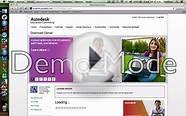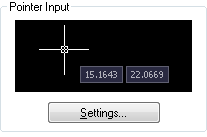Student AutoCAD for Mac
Dynamic input provides a command interface near the cursor in the drawing area.
Dynamic tooltips provide an alternative way to enter commands. When dynamic input is turned on, a tooltip displays dynamically updated information near the cursor. When a command is in progress, you can specify options and values in the tooltip text box.
The actions required to complete a command or to use grips are similar to those for the Command prompt. If the AutoComplete and AutoCorrect features are turned on, the program automatically completes the command and offers correct spelling suggestions just as it does on the command line. The difference is that your attention can stay near the cursor.
Dynamic Input and the Command Window
Dynamic input is not designed to replace the command window. You can hide the command window to add more area for drawing, but you will need to display it for some operations. Press F2 to hide and display Command prompts and error messages as needed. Alternately, you can undock the command window and use Auto-hide to roll open or roll up the window.
Control Dynamic Input Settings
Click the dynamic input button on the status bar to turn dynamic input on and off. Dynamic input has three components: cursor (pointer) input, dimension input, and dynamic prompts. Right-click the dynamic input button and click Settings to control what is displayed by each component when dynamic input is turned on.
Note: You can turn off dynamic input temporarily by holding down the F12 key.
Pointer Input
When pointer (cursor) input is on and a command is in progress, the coordinate location of the crosshairs is displayed in tooltip entry boxes near the cursor. You can enter coordinates in the tooltip instead of on the command line.
The default for second and subsequent points is relative polar coordinates (relative Cartesian for RECTANG). There is no need to type the @ sign. If you want to use absolute coordinates, use the # sign prefix. For example, to move an object to the origin, for the second point prompt, enter #0, 0.
You can control the default format for coordinates, and when the dynamic input tooltip is displayed.
Dynamic Prompts
When dynamic prompts are on, prompts are displayed in a tooltip near the cursor. You can enter a response in the tooltip instead of on the command line. Press the Down Arrow key to view and select options. Press the Up Arrow key to display recent input.
Note: To use paste text into a dynamic prompt tooltip, type a letter and then backspace to delete it before you paste the entry. Otherwise, the entry is pasted into the drawing as text.
You might also like











